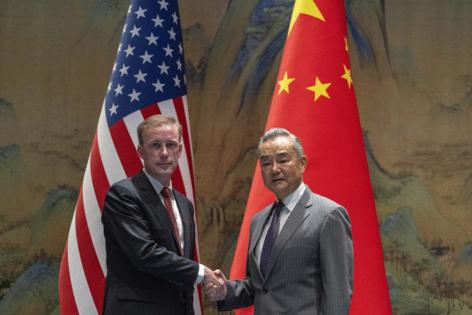US-China meeting paves way for leader talks in 'near future'
Published in News & Features
Chinese Foreign Minister Wang Yi and U.S. National Security Advisor Jake Sullivan discussed setting up new talks between their presidents in meetings aimed at managing the two nations’ difficult relationship.
“The two sides discussed a new round of interaction between the two heads of state in the near future,” China’s Foreign Ministry said in a readout published Wednesday evening, without saying how those communications will be conducted. A U.S. readout that followed noted that “both sides welcomed ongoing efforts to maintain open lines of communication, including planning for a leader-level call in the coming weeks.”
The two sides also agreed to hold a theater commander phone call “in the near future,” according to the U.S. readout. John Podesta, senior advisor to the president for international climate policy, is slated to travel to China to further discussions on climate cooperation.
Wang repeated China’s positions on a range of contentious issues from its territorial claim over self-ruled Taiwan to its objection to U.S. curbs on its tech ambitions. The Chinese diplomat also expressed a desire to stabilize ties between the world’s two largest economies that frayed during the Biden administration.
He urged the U.S. to stop arming Taiwan and reasserted Beijing’s claims in the South China Sea, calling on Washington not to “condone violations” by the Philippines. The remarks came after US Admiral Samuel Paparo, head of the U.S. Indo-Pacific Command, said the country was willing to accompany Philippine vessels during resupply missions in the disputed body of water amid recurring confrontations with Chinese ships.
For his part, Sullivan conveyed ongoing efforts to prevent advanced technology from undermining U.S. national security, concerns around stability in the Taiwan Strait and South China Sea, and China’s support for Russia’s industrial base as well as longstanding U.S. policies on human rights. The two sides also raised shared worries about North Korea, Burma, and the Middle East, according to the U.S. readout.
Despite their differences, the two sides agreed to maintain high-level exchanges and cooperation in areas such as anti-narcotic enforcement, climate change and artificial intelligence, according to the Chinese readout.
Sullivan is the first U.S. national security advisor to visit China since 2016. His trip comes months before the U.S. presidential vote in November that pits Vice President Kamala Harris against former President Donald Trump. While both candidates are set to maintain a tough stance on the world’s No. 2 economy, the Republican has threatened a blanket 60% tariff on Chinese exports.
President Joe Biden and Xi last met at a summit in San Francisco in November 2023, where they held talks that helped stabilize ties and rebuild a series of communication channels.
But while Biden has repeatedly touted spending “more time” with Xi than any other world leader at “about 90 hours,” he is set to be the first U.S. president since Jimmy Carter not to travel to China while in office, if he doesn’t make it to the Asian nation before January.
Strict Covid controls prevented travel into China during the global pandemic, and saw Xi remain within his nation’s borders for years — severely curtailing his international travel agenda and removing the opportunity for face-to-face diplomatic exchanges.
Relations between the two superpowers plunged during that period, after then-U.S. House Speaker Nancy Pelosi visited Taiwan in August 2022, causing Beijing to suspend military talks.
Other issues have hampered ties. Beijing has complained about U.S. efforts to cut off China from advanced tech, including semiconductors, and the White House’s moves to work with allies on security and economic issues. Canada announced it will impose tariffs on Chinese-made electric vehicles, aluminum and steel hours before Sullivan arrived in Beijing.
Despite those frictions, Sullivan and Wang have met face-to-face every few months in recent years as part of Biden’s push to keep open lines of communication, in a mechanism known as the “strategic channel.”
-------
(With assistance from Colum Murphy and Michelle Jamrisko.)
©2024 Bloomberg L.P. Visit bloomberg.com. Distributed by Tribune Content Agency, LLC.







Comments